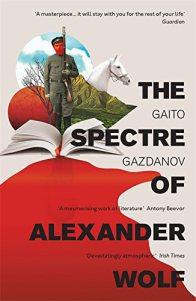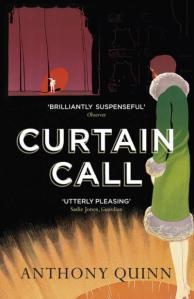 ‘Of all my memories, of all my life’s innumerable sensations, the most onerous was that of the single murder I had committed.’ So begins Gaito Gazdanov’s haunting and mercurial novella, The Spectre of Alexander Wolf. The narrator was a mere sixteen years old when he became caught up in the Russian civil war, and it was after a period of intense and sleepless battle that he found himself cut off from his troop. Fortunately, he came across a riderless Cossack mare and hoisted himself into the saddle, but he had scarcely begun to canter before the horse collapsed under him, brought down by a sniper. Scrabbling in the dirt, the narrator saw a white stallion approaching, carrying his assailant. A pure reflex reaction; he shot back in self-defence and the man fell. In the brief moment after this, our narrator walked over to where the body lay, saw a young man of twenty-three or four slowly dying, and then as he registered the sound of horses’ hooves, he took the stallion and made his escape.
‘Of all my memories, of all my life’s innumerable sensations, the most onerous was that of the single murder I had committed.’ So begins Gaito Gazdanov’s haunting and mercurial novella, The Spectre of Alexander Wolf. The narrator was a mere sixteen years old when he became caught up in the Russian civil war, and it was after a period of intense and sleepless battle that he found himself cut off from his troop. Fortunately, he came across a riderless Cossack mare and hoisted himself into the saddle, but he had scarcely begun to canter before the horse collapsed under him, brought down by a sniper. Scrabbling in the dirt, the narrator saw a white stallion approaching, carrying his assailant. A pure reflex reaction; he shot back in self-defence and the man fell. In the brief moment after this, our narrator walked over to where the body lay, saw a young man of twenty-three or four slowly dying, and then as he registered the sound of horses’ hooves, he took the stallion and made his escape.
Many years later, in Paris, he comes across a book of short stories by an English author unknown to him. One of those stories is entitled ‘The Adventure in the Steppe’ and it is, of course, exactly the same story as his long-held memory, only from the point of view of the man he killed. From this moment on, the story’s author, Alexander Wolf, holds a magnetic attraction for him. To begin with, he tries to seek him out, approaching his English publisher who does not know where he is and clearly hates him. But then Alexander Wolf seems to have been supernaturally summoned, as the narrator walks into a bar and falls into conversation with an old soak there, only to find he is a friend of Wolf; one who was his comrade in the war, and who took him to hospital when he found him dying of a gunshot wound.
So, our narrator’s victim does indeed live on, and fate seems determined to draw them closer together to finish what they started. When the narrator falls headlong in love with a Russian woman he meets at a boxing match, and she has a mysterious lover in her past about whom she will not speak… well, the narrator doesn’t cotton on, but the reader certainly will.
This is a dense and curious story, psychologically fraught with the devastating power of what it means to take a life. A man who kills, our narrator argues, “is given the opportunity to become, for some short space of time, more powerful than fate and chance, earthquake and tempest, and to know the exact moment when he’ll put a stop to that long and complex evolution…Love, hatred, fear, regret, remorse, will, passion…all is helpless before the momentary power of murder.” Having known this power – in a guilty, stricken, senseless kind of way – the narrator is unable to recover from it. It’s as if a part of his own life has stopped at the moment he shot the rider of the white horse, and in consequence all he has subsequently lived through has been full of “regrets, dissatisfaction and a sense of manifest futility of everything I did.” The resurrection of Alexander Wolf is galvanizing, as is the relationship with Yelena (“Every love affair is an attempt to thwart fate.”), but playing with the power of fate is a crazy thing to do, the novella suggests, as it is jealous, and all too inclined to make puppets out of those who try to rise above its reach.
This is beautifully written and steeped in that glorious world-weary-emigré atmosphere of mid-20th century Europe. Gazdanov was a taxi driver at night in Paris to fund his writing, and this was his fifth novel, published in 1947. I am sorry to say that I put this on my wish list after reading a review of one of Gazdanov’s novels at Karen’s blog which featured a photo of the wondrously handsome author. It’s good to know that being shallow as a teaspoon doesn’t prevent a person from falling into the path of little-known masterpieces.

This is a novel that comes into being because of an attempted murder, but it is not solely focused on that crime. Instead, it’s more concerned with the lives of a group of people who are brought into contact with one another because of it. These include primarily the theater critic, James Erskine, an egotistical elderly man whose homosexuality keeps drawing him into troublesome situations, and who is based on the life of a real critic and diarist, James Agate. Also, the critic’s put-upon secretary, Tom, whose epilepsy he attempts to keep secret (again with damaging results) and Madeleine, the young woman whose poverty has forced her to turn tricks, and who is the near-victim that Nina’s intervention saves.
In all honesty, it’s a while since I read this and the details are already hazy. But I did read it with enjoyment, feeling quite safe in the confident hands of this novelist. The fact it isn’t properly speaking a piece of crime fiction but a historical novel makes the ending feel a little odd, when the mystery is hastily solved. But the period detail is beautifully done and the story held my attention effortlessly. Given I’ve had a slightly disappointing run of contemporary novels lately, this was a step back onto higher ground.
Ooh and I nearly forgot to mention – on Thursday the Extra Shiny is out – with more reviews and article, plus our Book Club discussion on Sarah Water’s The Paying Guests, which I have just finished (am longing to compare notes with others). Also, we’ve got a new competition to announce. All this and more on the 20th!
